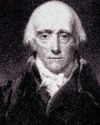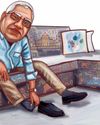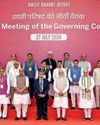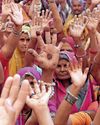
In 2017, shortly after the budget speech in Parliament, in which then finance minister Arun Jaitley spelt out the government’s intent to introduce the Electoral Bonds Scheme, the Association for Democratic Reforms (ADR) and Common Cause, two civil society organisations, mounted a joint legal fight against the scheme. Around the same time, Commodore Lokesh Batra (retd), a Navy veteran who now describes himself as a transparency campaigner, began his dogged pursuit against the scheme through the Right to Information Act.
It took seven years for these activists to find success, with the Supreme Court, on February 15, declaring the scheme unconstitutional and invalid. “The court has upheld the right to information of the common man about funding of political parties,” said ADR head Maj Gen Anil Verma (retd). “The scheme had grave anomalies which the Election Commission, the Reserve Bank of India, government departments and civil society organisations had pointed out, but the government had rammed it through Parliament in the form of a Money Bill to escape scrutiny by the Rajya Sabha.”
The petitioners had argued that wide-ranging amendments in the Finance Act, 2017; Finance Act, 2016; the Representation of the People Act, 1951; the Reserve Bank of India Act, 1934; the Income Tax Act, 1961; and the Companies Act, 2013, were brought in as part of a Money Bill. The apex court has not yet resolved the matter about the government's money bill route.
Esta historia es de la edición March 03, 2024 de THE WEEK India.
Comience su prueba gratuita de Magzter GOLD de 7 días para acceder a miles de historias premium seleccionadas y a más de 9,000 revistas y periódicos.
Ya eres suscriptor ? Conectar
Esta historia es de la edición March 03, 2024 de THE WEEK India.
Comience su prueba gratuita de Magzter GOLD de 7 días para acceder a miles de historias premium seleccionadas y a más de 9,000 revistas y periódicos.
Ya eres suscriptor? Conectar

Doctor's doctors
Internists deal with prevention, diagnosis and treatment of all kinds of diseases, while also coordinating with doctors across specialties

WORK THIS OUT!
What is the true cost of a 90-hour workweek? Reduced productivity, mental health issues and severe health risks, say doctors

The experience of oppression
The British enacted several laws that might appear liberal, only to then veto the invocation of progressive measures. Nevertheless, these milestones guided the founding fathers in conceiving and creating the Constitution of India

One, two, buckle my shoe!
“Darling,” I said to my life companion of more years than I care to remember, “Do you think there is any correlation between pain in the feet and attending prayer meetings?”“You really are a stupid old man!” said the light of my life. “Can’t you think of anything more bizarre so late at night?”

A helping hand
Over the past year, Imaginarium has placed 3D-printed parts in space, in human bodies, in oil fields in the Middle East, and as drones on the Indian border

Fading federalism
One of the most visible indicators of the erosion of state autonomy is the diminishing financial independence of states

FOUNDING MOTHERS OF THE CONSTITUTION
THEIR CONTRIBUTION IN THE MAKING OF THE REPUBLIC REMAINS EXEMPLARY AND INSPIRING

Value every breath
VO2 max is the best way to measure fitness and predict life expectancy

Statutes of unity
The Constitution reminds us that national oneness comes through addressing inequalities, not enforcing uniformity

Incomplete equality
Equal marriage rights is one of the last bastions of patriarchy and to dismantle it, the recognition of marital rape as an offence is non-negotiable